人教版高一英语必修三Unit3Reading重点单词、句型知识点
人教课标版高中英语必修3Unit3_Reading_词汇导图语境速记
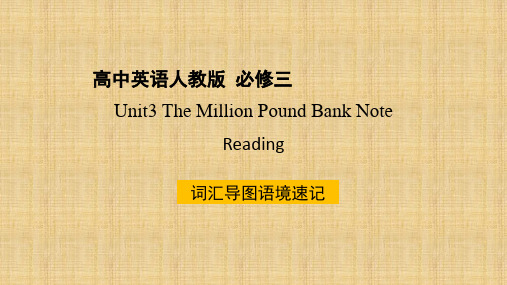
ask for permission 请求允许 with/without one's permission
得到某人的允许/未经某人的允许
跟permit用法类似的动词有: allow doing sth./allow sb. to do sth. 允许(某人)做某事 forbid doing sth./forbid sb. to do sth. 禁止(某人)做某事 advise doing sth./advise sb. to do sth. 建议(某人)做某事
为……做好准备(或铺平道路); 事先介绍情况
bet v.打赌;赌钱
bet sth.on sth. 用…….赌… bet on/against sth. 下赌注(于)
bet v.敢说 I bet(that).. 我敢说…
bet
make a bet 打赌
bet n.打赌;赌钱
win/lose a bet 赢/输一场赌
明摆着;显而易见
be staring sth. in the face
不可避免
stare sb. out/down
盯得某人转移目光(或慌了神)
高考佳句
(2015 北京,七选五)They stare off into space and wander by themselves.
他们凝视着前方,独自神游。
漫画助记
Smoking is not permitted in most public places.
大部分公共场合禁止吸烟。
着手;开始做;进行
go ahead with the plan 开始实施计划
go ahead
(用于祈使句) 可以;往下说/做
(请某人)先走,先做
高一必修三英语unit3知识点
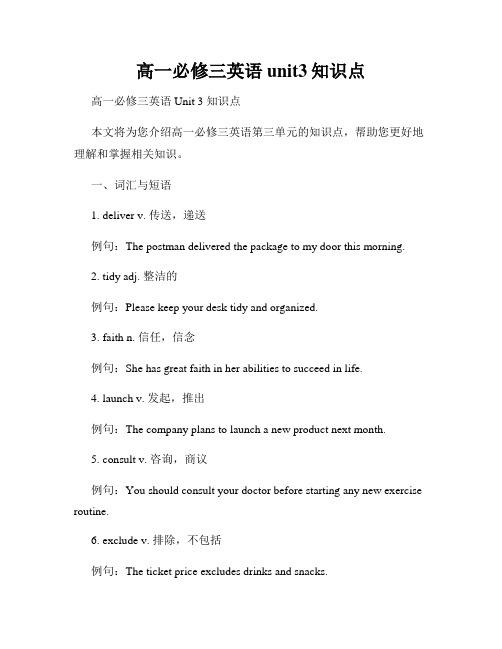
高一必修三英语unit3知识点高一必修三英语Unit 3 知识点本文将为您介绍高一必修三英语第三单元的知识点,帮助您更好地理解和掌握相关知识。
一、词汇与短语1. deliver v. 传送,递送例句:The postman delivered the package to my door this morning.2. tidy adj. 整洁的例句:Please keep your desk tidy and organized.3. faith n. 信任,信念例句:She has great faith in her abilities to succeed in life.4. launch v. 发起,推出例句:The company plans to launch a new product next month.5. consult v. 咨询,商议例句:You should consult your doctor before starting any new exercise routine.6. exclude v. 排除,不包括例句:The ticket price excludes drinks and snacks.7. accompany v. 陪同,伴随例句:I'll accompany you to the airport so that you won't get lost.8. focus n. 焦点,重点例句:The meeting's focus will be on the company's future expansion plans.9. transfer v. 转移,调动例句:He was transferred to the company's branch office in New York.10. obtain v. 获得,得到例句:You can obtain a copy of the report from the receptionist.二、语法知识1. 动词的时态和语态英语动词有多种时态和语态,如一般现在时、一般过去时、现在进行时、过去进行时、一般将来时、被动语态等。
人教版高中英语必修3unit3课文知识点详解
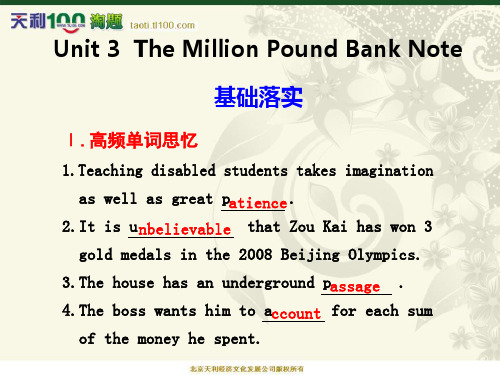
gold medals in the 2008 Beijing Olympics.
3.The house has an underground passage . 4.The boss wants him to account for each sum of the money he spent.
5.On the contrary,I’ve just begun.
2.I wonder,Mr.Adams,if you’d mind us asking
a few questions.亚当斯先生,我想知道你是否介 意我们问你几个问题。 考点提炼 _____ 宾语 。 if至句末是_____ 宾语 从句,作wonder的
常用搭配:
I wonder if/whether...我想知道是否„„ at...对„„感到惊奇/惊讶 wonder that从句想知道„„ wonder+wh想知道„„
即学即用 (1)北海石油占我国出口收入的很大一部分。 North Sea oil _____________ accounts for a high part of our export earnings.
(2)他的考试成绩不是很好,但我们必须考虑到他曾
长期生病。 His exam results were not very good,but we must __________________ take into account his long illness.
4.scene
Act I,______ Scene 3(回归课本P17) 观察思考 It’s a happy scene of children playing in the garden.
人教版高一英语必修三unit3知识点
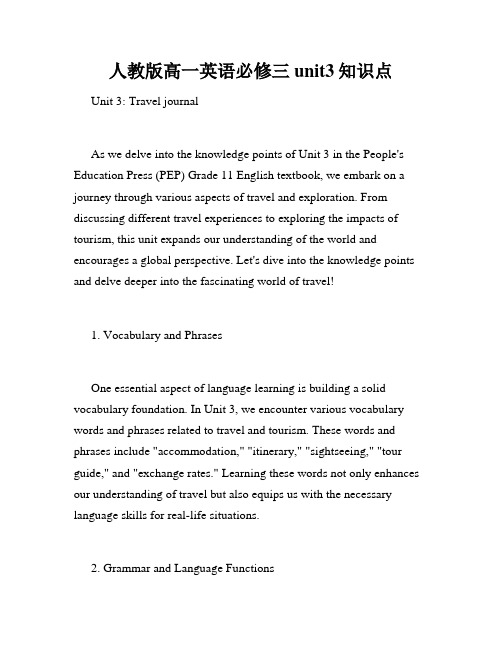
人教版高一英语必修三unit3知识点Unit 3: Travel journalAs we delve into the knowledge points of Unit 3 in the People's Education Press (PEP) Grade 11 English textbook, we embark on a journey through various aspects of travel and exploration. From discussing different travel experiences to exploring the impacts of tourism, this unit expands our understanding of the world and encourages a global perspective. Let's dive into the knowledge points and delve deeper into the fascinating world of travel!1. Vocabulary and PhrasesOne essential aspect of language learning is building a solid vocabulary foundation. In Unit 3, we encounter various vocabulary words and phrases related to travel and tourism. These words and phrases include "accommodation," "itinerary," "sightseeing," "tour guide," and "exchange rates." Learning these words not only enhances our understanding of travel but also equips us with the necessary language skills for real-life situations.2. Grammar and Language FunctionsWithin the realm of travel, grammar helps us communicate effectively. Unit 3 introduces several grammatical structures and language functions that are commonly used when discussing and describing travel experiences. For instance, we learn about the future tense with "will" and "be going to," comparative adjectives, and superlative adjectives. Mastering these language skills allows us to express ourselves accurately while discussing travel plans, preferences, and experiences.3. Listening and SpeakingEffective communication lies at the heart of travel experiences. Unit 3 provides ample opportunities to improve our listening and speaking skills. Through listening activities, we practice understanding various travel-related conversations, such as obtaining information about flights or hotel reservations. Additionally, speaking activities enable us to express our travel preferences, discuss tourist attractions, and recount memorable experiences, fostering both fluency and accuracy in spoken English.4. Reading and WritingReading and writing skills play a vital role in enhancing our understanding and expression of travel-related topics. Unit 3 offers engaging reading materials that allow us to explore different travel experiences, such as hiking the Great Wall of China or backpacking through Europe. These readings not only broaden our knowledge about different destinations but also expose us to diverse cultures and perspectives. Writing tasks prompt us to create travel blog entries, share our opinions on ethical tourism, or write letters seeking travel advice. These activities polish our writing skills while encouraging creativity and critical thinking.5. Cultural CornerUnit 3's Cultural Corner provides valuable insights into the cultural aspects of travel. By learning about specific traditions, customs, and etiquette of different countries, we become more culturally sensitive and aware during our travels. This section helps us understand the importance of respecting local customs and embracing different cultural practices, fostering meaningful and respectful global interactions.In conclusion, Unit 3 of the People's Education Press Grade 11 English textbook takes us on a thrilling journey through the world oftravel and exploration. Through its comprehensive coverage of vocabulary, grammar, listening, speaking, reading, writing, and cultural aspects, we develop essential language competencies while broadening our horizons. Embrace the adventure, absorb the knowledge, and embark on your own travel journal as you continue to explore the fascinating world of English learning!。
高中英语人教版必修三第三单元核心词汇和短语
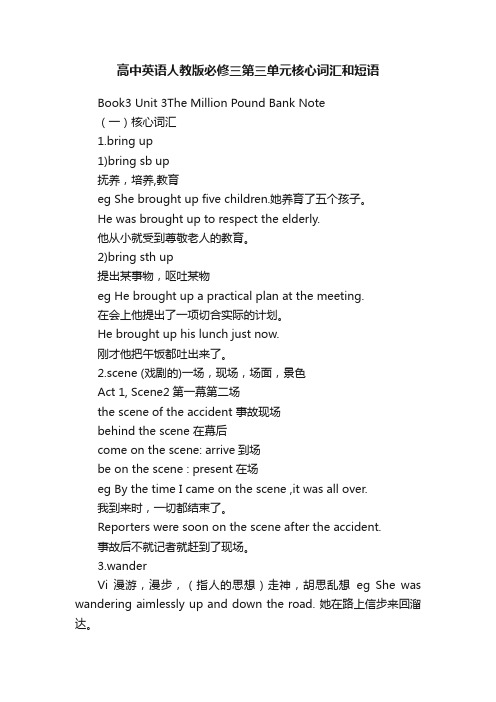
高中英语人教版必修三第三单元核心词汇和短语Book3 Unit 3The Million Pound Bank Note(一)核心词汇1.bring up1)bring sb up抚养,培养,教育eg She brought up five children.她养育了五个孩子。
He was brought up to respect the elderly.他从小就受到尊敬老人的教育。
2)bring sth up提出某事物,呕吐某物eg He brought up a practical plan at the meeting.在会上他提出了一项切合实际的计划。
He brought up his lunch just now.刚才他把午饭都吐出来了。
2.scene (戏剧的)一场,现场,场面,景色Act 1, Scene2第一幕第二场the scene of the accident 事故现场behind the scene 在幕后come on the scene: arrive到场be on the scene : present在场eg By the time I came on the scene ,it was all over.我到来时,一切都结束了。
Reporters were soon on the scene after the accident.事故后不就记者就赶到了现场。
3.wanderVi 漫游,漫步,(指人的思想)走神,胡思乱想eg She was wandering aimlessly up and down the road. 她在路上信步来回溜达。
Don’t let your mind wander.不要思想开小差。
4.permitn 许可证,通行证a driving permit 驾驶执照照vt & vi(permitted ,permitted) 许可,允许permit sb to do sth 允许某人做某事permit doing sth 允许做某事eg Visitors are not permitted to take photos.参观者请勿拍照片。
英语必修三Unit3单词及语言点总结
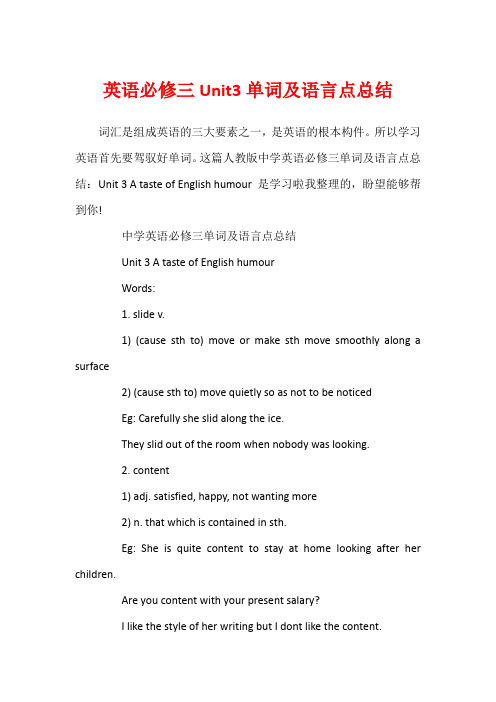
英语必修三Unit3单词及语言点总结词汇是组成英语的三大要素之一,是英语的根本构件。
所以学习英语首先要驾驭好单词。
这篇人教版中学英语必修三单词及语言点总结:Unit 3 A taste of English humour 是学习啦我整理的,盼望能够帮到你!中学英语必修三单词及语言点总结Unit 3 A taste of English humourWords:1. slide v.1) (cause sth to) move or make sth move smoothly along a surface2) (cause sth to) move quietly so as not to be noticedEg: Carefully she slid along the ice.They slid out of the room when nobody was looking.2. content1) adj. satisfied, happy, not wanting more2) n. that which is contained in sth.Eg: She is quite content to stay at home looking after her children.Are you content with your present salary?I like the style of her writing but I dont like the content.3. astonish vt. fill with sudden wonder or amazementeg: It will astonish you to hear what I paid for this ring.It was such an astonishing performance for such a young musician.4. particular1) adj. not general or universal2) adj. separate and distinct from others of the same group, category, or natureeg: She has a particular preference for Chinese art.We will make an exception in this particular case.5. entertain1) vt. to hold the attention of with something amusing or diverting2) vt. to hold the attention of with something.Eg: He entertained friends at dinner.I amused myself with a game of solitaire.They are much more entertaining than half the novels that are written.adj. entertaining n. entertainment6. throughout : prep. In, to, through, or during every part of; all througheg: The road is kept open throughout the year.The material is flawed throughout.Through unsure how her speech would be received, she remained calm and professional throughout.7. homeless1) adj. having no home or haven2) n. people without homes considered as a groupeg: When he broke away from his family, he became homeless.He often provides food to the homeless.8. failure n.1) the condition or fact of not achieving the desired end or ends2) one that failsEg: They were afraid of risking failure because they didnt want to lose face.Failure is the mother of success.He is a failure at his career.9. overcome vt. conquer; get the better ofeg: The learner of a second language has many obstacles to overcome.She was overcome with emotion.10. snowstorm n. a storm marked by heavy snowfalleg: According to the weather report, theres snowstormblowing up this evening.They were caught in the snowstorm.11. chew1) vt. to bite and grind with the teeth; masticate2) vt. to meditate on; ponder3) to cogitate; meditateeg: You must chew your food before you swallow it.He chewed a problem over.He chewed on the difficulties ahead.12. direct1) vt. to give guidance and instruction to2) vt. to give authoritative instructions to3) vt. to show or indicate the way foreg: Who directed the new Indian film?He directed the students to answer.The driver directed us to the airport.13. star vi. to play the leading role in a theatrical or film prodectioneg: One of my favorite old films starring Charlie Chaplin.Chenglong starred in many famous films.14. fortune1) n. [u] the chance happening of fortunate or adverse event;2) n. success, especially when at least partially resulting from luck3) a large sum of moneyeg: He decided to go home for the holidays, and his fortune turned for the worse.No matter what they tried, it ended in fortune.He spent a fortune on the new car.15. whisper1) vi. vt. to speak softly2) to make a soft rustling soundeg: He is whispering to his neighbor.The two girls were whispering in the library.The wind whispered in the pines.16. vast1) adj. very great in size, number, amount, or quantity2) very great in area or extent; immense3) very great in degree or intensityeg: We bought the house at vast cost.All the lands was shrouded in our vast forest.The city is vast compared to our village.Useful phrases:1. badly off : in a poor position, esp financiallyEg: They are too badly off to have a holiday.In fact most people are better off than they were five years ago.反义:well off2. worn-out1) adj. worn of used until no longer usable or effective2) thoroughly exhausted; spenteg: He wore a pair of worn-out shoes.I was worn-out after the long journey.3. pick out1) to choose or select2) to discern from the surroundings ; distinguisheg: They picked out the best piece of silk.They picked out their cousins from the crowd.4. cut off1) to separate from others; isolate2) to stop suddenly; discontinueeg: When the city was cut off, everyone know that the total defeat was certain.They cut off our food supply.The telephone operator cut us off.。
高一英语必修三unit3单词知识点
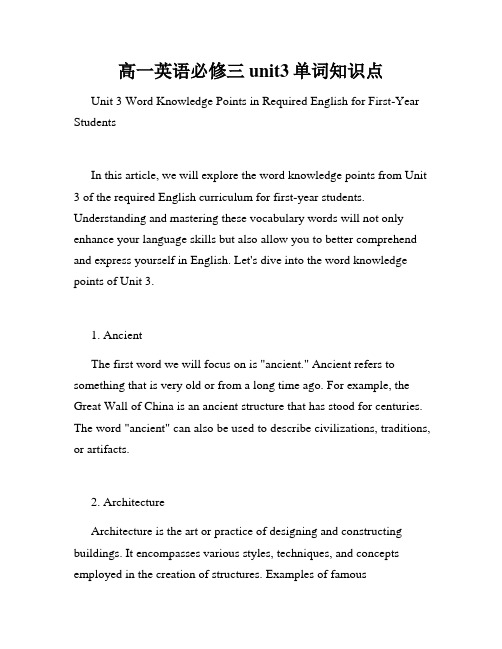
高一英语必修三unit3单词知识点Unit 3 Word Knowledge Points in Required English for First-Year StudentsIn this article, we will explore the word knowledge points from Unit 3 of the required English curriculum for first-year students. Understanding and mastering these vocabulary words will not only enhance your language skills but also allow you to better comprehend and express yourself in English. Let's dive into the word knowledge points of Unit 3.1. AncientThe first word we will focus on is "ancient." Ancient refers to something that is very old or from a long time ago. For example, the Great Wall of China is an ancient structure that has stood for centuries. The word "ancient" can also be used to describe civilizations, traditions, or artifacts.2. ArchitectureArchitecture is the art or practice of designing and constructing buildings. It encompasses various styles, techniques, and concepts employed in the creation of structures. Examples of famousarchitectural works include the Taj Mahal in India, the Colosseum in Rome, and the Sydney Opera House in Australia.3. Astonishing"Astonishing" is an adjective used to describe something that is extremely surprising or impressive. It suggests a sense of awe or wonderment. For instance, witnessing a breathtaking sunset over the ocean can be described as astonishing.4. BroadenTo "broaden" means to increase the scope, range, or extent of something. It implies expanding one's knowledge, experience, or horizons. By reading a variety of books, you can broaden your understanding of different subjects.5. CivilizationCivilization refers to an advanced stage of human social development, characterized by complex societal structures, institutions, and cultural achievements. The ancient Egyptian civilization, for example, left behind remarkable architectural wonders, such as the pyramids.6. EnsureThe word "ensure" means to make certain that something will happen or be the case. It involves taking necessary measures to guarantee a desired outcome. For instance, wearing a helmet while riding a bicycle ensures your safety.7. EvokeTo "evoke" is to bring forth or elicit a particular feeling, memory, or response. It involves creating a strong emotional or sensory impact. A beautiful melody can evoke feelings of happiness or nostalgia.8. InevitableSomething that is "inevitable" is bound to happen or occur, regardless of efforts to prevent it. It suggests an unavoidable or inescapable outcome. Death, for example, is an inevitable part of life.9. MonumentA "monument" is a structure, statue, or marker that serves as a memorial or commemorative symbol of a person, event, or historical significance. The Statue of Liberty in New York is a famous monument that represents freedom and democracy.10. PreserveTo "preserve" means to protect or maintain something in its original or existing state. It involves safeguarding it from damage, deterioration, or decay. Preserving historical artifacts ensures that future generations can learn from them.By familiarizing yourself with these word knowledge points from Unit 3, you will be able to enhance your English vocabulary and better understand various aspects of language and culture. Incorporating these words into your conversations and writing will make your English more precise and effective. Remember to continue exploring and expanding your vocabulary to excel in your English studies.。
人教版高中英语必修三第3单元重点句型及精讲
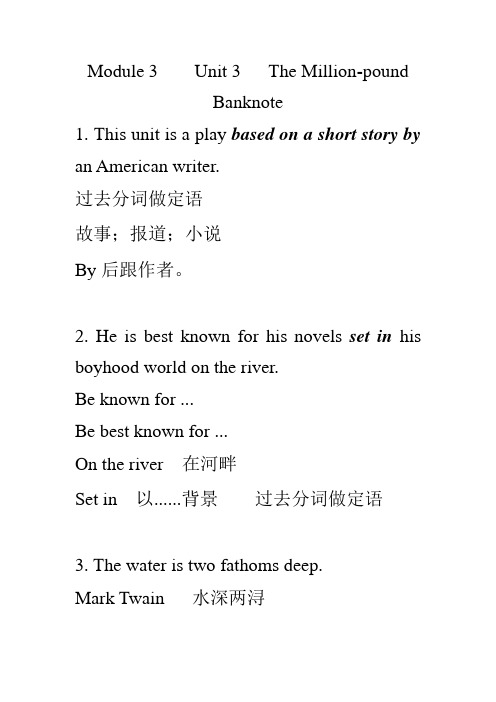
Module 3 Unit 3 The Million-poundBanknote1. This unit is a play based on a short story by an American writer.过去分词做定语故事;报道;小说By后跟作者。
2. He is best known for his novels set in his boyhood world on the river.Be known for ...Be best known for ...On the river 在河畔Set in 以......背景过去分词做定语3. The water is two fathoms deep.Mark Twain 水深两浔TwinTwins4. Narrator: ... It is Henry Adams, an American businessman, who is lost in London.5. How well do you know London?How many6. I wonder if yo u’d mind us asking a few questions.Mind sb doingMind I/ me/ my/ Jim/ Jim’s asking7. The fact is that I earned my passage by working as an unpaid hand, which accounts for my appearance.That引导表语从句Unpaid hand 义工We are a hand short. 我们少个人手。
Account for 是......的原因8. I’m afraid I don’t quite follow you.明白Follower 门徒9. Now if you’ll excuse me, I think I will be on my way.Excuse me 打扰一下;失陪;借过10. I don’t want your charity. I just want an honest job.Charity store 慈善商店Decent11. First find what Henry says or does on the following occasions...On the occasionOn these occasions 每当此时On one occasion 有一次On another occasion 又一次On many occasions 总是Occasion vt. 导致OpportunityOpportune 适当的;合适的12. The professor wandered from the subject of his speech.跑题13. I opened an account at the bankdownstairs.开户Savings account 活期账户Deposit account 定期Draw money from the bank 取钱14. Underline all the examples in the play where noun clauses are used as the object. Mark a star beside each of them.Where引导定语,表示抽象的所在。
- 1、下载文档前请自行甄别文档内容的完整性,平台不提供额外的编辑、内容补充、找答案等附加服务。
- 2、"仅部分预览"的文档,不可在线预览部分如存在完整性等问题,可反馈申请退款(可完整预览的文档不适用该条件!)。
- 3、如文档侵犯您的权益,请联系客服反馈,我们会尽快为您处理(人工客服工作时间:9:00-18:30)。
Book3 Unit3大课文知识点
1. be based on 以 …. 为基础
2. be set in以 …. 为背景
Eg: The play was set in World War Ⅱ.
3. make a bet with sb.和某人打赌
4. be lost in 在 … 迷路,沉浸在… 中
5. on one’s/the left/right 在 …左/右侧
6. lead the way 领路,带路
7. ----How do you do? 你好吗?
8. mind (sb./sb.’s) doing介意(某人)做…
9. as a matter of fact 事实上
=in fact=in reality=actually
10. by accident=by chance
11. sail out of…驶出…
12. stare at 盯着
13. find +宾语+ adj./介短/-ing / -ed/n.
14. had just done…when…
15. work as 担当…角色,做…工作= act /serve as
16. account for…是…的原因
17. to be honest老实说 =honestly speaking
18. What luck!真走运!
19. on the contrary正相反
20. care about 关心
21. not…until…直到…才…
22. show sb. out\in 领…出去/进来
show sb. around \round sp. 带领…参观…
重点句型
1. It is Henry Adams ,an American businessman, who is lost in London and does not know what he should do.
2. ...I found myself carried out to sea by a strong wind.
3.The next moring I'd just about given myself up for lost when I was spotted by a ship.
4. And it was the ship that brought you to England.
5. The fact is that I earned my passage by working as an unpaid hand, which accounts for my appearance.
6. That's why we've given you the letter.
1.I t i s H e n r y A d a m s,a n A m e r i c a n businessman, who is lost in London and does not know what he should do.
解析:本句中an American business 为同位语;who引导的是非限制性定语从句; be lost in 译为“在……迷路;沉浸在……中”。
be lost in 在...中迷路;沉浸于
1) He was lost in the forest for a week and was finally rescued by his parents.(作谓语)他迷失在树林里一个星期,最后被父母救了出来。
2)Lost in reading his book, he forgot to go home.(作状语)
他看书入了神,以至忘了回家。
2. ...I found myself carried out to sea by a strong wind.
分析:find+宾语+宾补 adj./adv./n./介词短语
现在分词
过去分词
eg:We found him waiting to receive us.
I found my book stolen.
find it +adj./n. +to do sth it是形式宾语eg: I find it easy to learn English.
3.The next moring I'd just about given myself up for lost when I was spotted by a ship.
分析:had just done…when… 刚做完……这时突然……拓展:
be about to do…when… 正要做……这时……
be doing…when… 正在做……这时……
be on the point of doing…when… 正要做……这时……eg: I was about to go when it began to rain.
我正要走这时下雨了。
4.And it was the ship that brought you to England.
分析:“It is/was +被强调的部分+that …”:这是强调句型。
如:
It was in this room that Lu Xun once lived. 这就是鲁迅住过的房间。
5.The fact is that I earned my passage by working as an unpaid hand, which accounts for my appearance.
分析:that引导表语从句。
which引导定语从句,代替前面的整个主句。
work as“担任……角色;做……工作”account for“……的原因”
6.That's why we've given you the letter.
分析:
(1)This/That/It is why +结果... “这/那就是......的原因”。
That's why I want to work there.
(2) This /That/It is because+原因... “这/那是因为......”。
It's just because he doesn't know her.。
